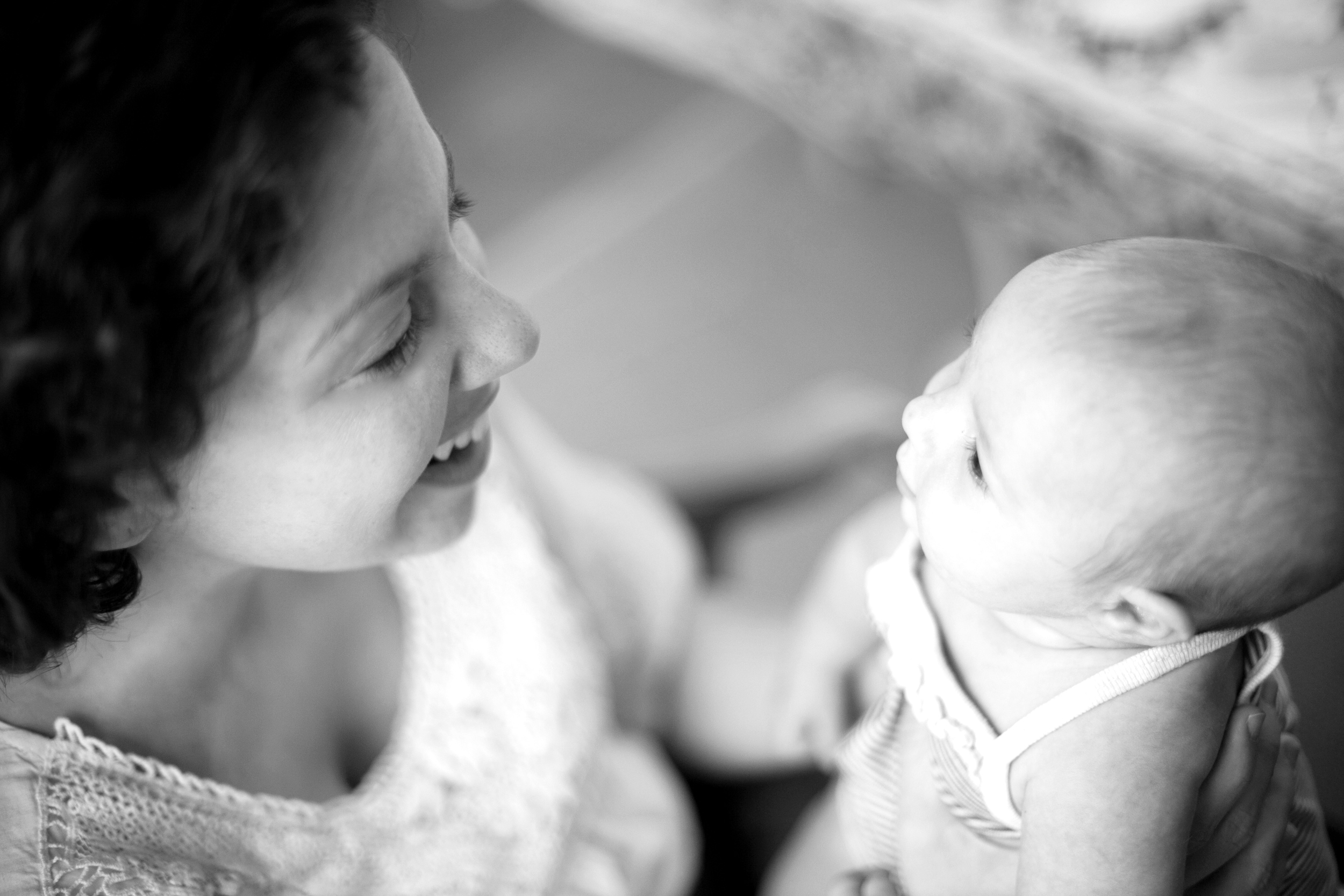I Supplemented With Formula and Am Still Breastfeeding.
On July 6th, Miss E turned 18 months. On that day I nursed her in the glider I hadn't used for a while. As we sat there I couldn't help but think how far we had come. I want to be honest.
Those first few weeks were HARD! I wish people had been honest about it. The thing I heard most often was, "breastfeeding is natural, your body was made for this". Well, supposedly my body was made to have a baby, too, yet, Miss E was born via an unplanned c-section after 12+ hrs in the hospital. I couldn't push her out, but that's a story for another day.
 Anyway here's what I want to say: while I agree formula should not be pushed on anyone, I do believe if used "properly" it can be helpful to a nursing mother. My intent is not to judge how someone chooses to feed their child, but to share how it was beneficial in my own breastfeeding journey. I can already hear the gasps and tsk, tsks from lactation consultants and breastfeeding advocates. But you know what? I don't think I'd still be breastfeeding if supplementing hadn't been suggested.
Anyway here's what I want to say: while I agree formula should not be pushed on anyone, I do believe if used "properly" it can be helpful to a nursing mother. My intent is not to judge how someone chooses to feed their child, but to share how it was beneficial in my own breastfeeding journey. I can already hear the gasps and tsk, tsks from lactation consultants and breastfeeding advocates. But you know what? I don't think I'd still be breastfeeding if supplementing hadn't been suggested.
As a new mom, I was worried about Miss E's lethargy. Her latch was pretty good, but getting her to take an interest in nursing was a bigger problem. I felt that maybe this wasn't the way it should be. I talked to the nurses and they mentioned it to the pediatrician. On his next rounds, he asked me about my concerns and I expressed them. He then shared with me that in his family, his wife, also a pediatrician, struggled with breastfeeding their first child. He said that with all the studies out there, they didn't want to chance nipple confusion by introducing a bottle. It was different with their second child. After much research they decided that supplementing with formula wouldn't be so bad. Their second child was a better breastfeeder. He explained that since my milk hadn't come in yet, Miss E was using a lot of energy for little return and that could be causing the lethargy. He then explained to me how to supplement if I chose to do so. At each feeding, I was instructed to put Miss E to each breast for 10 mins, and only after that was I to give her a bottle. We only did it for her first week. After that I was comfortable enough that my milk had come in and felt she was nursing better.
So what's my point with all this?
I had resolved to breastfeed Miss E, but I know if I had continued to worry about whether or not she was getting what she needed, my resolve may have faltered. Having the formula available allowed me to continue to try breastfeeding without the fear that she would starve. It was a real fear for me, especially after my body "failed" at another natural process, birth. With the formula available, I stressed less about nursing. I knew that if it turned out I couldn't nurse, I had a back up plan.
We also have to be careful when we put so much emphasis on how much of a "superwoman" someone is for breastfeeding. Statements like that neglect the fact that although breastfeeding is natural, not all bodies are made to do it. We would never make a diabetic feel bad for not being able to produce insulin. I think because of my experience, I don't understand why we get into "breastfeeding versus formula feeding mommy wars". Shouldn't the point be that we are feeding our children? There are so many reasons why people choose to breastfeed and there are probably just as many reasons why people choose not to. The important thing for us to remember is cliched, but true. We haven't walked in another woman's shoes and therefore shouldn't judge her decisions.
Understanding the Stomach Capacity of a Newborn
 Unnatural proportions of milk are believed by many, to be needed, for feeding a newborn baby.
Unnatural proportions of milk are believed by many, to be needed, for feeding a newborn baby.
I would like to put into perspective what is actually needed to fill a newborn tummy over the first few days of life.
A newborn is not thirsty or hungry at birth; the placenta has hydrated the baby for the immediate postpartum hours. The newborn’s golden hour immediately after birth is for bonding, learning how to eat out of the womb, and to start consuming that fabulous colostrum which is excellent medicinally and nutritionally.
How much is too much? Stomach sizes can vary with each baby. Their milk capacity can differ by the gestational age and size of the baby. The average stomach capacity of a newborn is about 7 mL, keeping in mind that 30 mL is 1 ounce. In the first two days of life, 2-15 mL feedings are sufficient for the baby’s well-being.
When babies are given 30-60 mL of artificial milk and are expected to consume this excessive amount, it is an unnatural and unrealistic proportion for their stomachs.
Just to give you a visual of a baby’s tummy…
Age: 1 day Amount Stomach Can Hold: 5-7 mL Comparable Object: hazelnut, thimble, glass marble, thumb nail
Age: 3 days Amount Stomach Can Hold: 22-27 mL (about an ounce) Comparable Object: teaspoon, milk ball, large glass marble
Age: 10 days Amount Stomach Can Hold: 45-60 mL (1.5-2 ounces) Comparable Object: walnut, golf ball, coffee measuring scoop
High volume feeds in the first few days of life can actually stress a newborn’s immature kidneys. That is why colostrum is a low volume, perfectly measured milk. Our bodies know what our babies need. Trust them! --------------- Disclaimer: Anticipation and Beyond uses all reasonable effort to provide accurate, up-to-date and evidence-based information for teaching and counseling purposes. All information that is written for blogs, social media posts, and websites is to be used for education and informational purposes only. All data and instruction from Anticipation and Beyond should not be intended to replace or substitute professional or medical advice from your health care provider. Direct all of your family’s concerns, questions, and health issues to your health care provider. The information provided is not and may not be applicable to every situation. The purpose of Anticipation and Beyond providing guidance and education to new families is two-fold. The first purpose is for the intention of teaching parents about the many choices and alternatives that are available to them. The second motivation is to encourage families to dig down deep and research themselves from reliable resources that will help to enlighten their new journey.
The Act of Nursing
I’m a formula feeding mom. Not by my mind’s choice, but my body’s. Most days I really don’t think twice about it. I don’t feel sad. I don’t feel guilty. I just shake up a bottle, hold my little one close and watch her drink up like it’s nectar straight from heaven.
Last night though, she caught her brother’s cold. She couldn’t breathe; she couldn’t sleep. Thoughts of guilt started setting in. If only I could of breastfeed, she wouldn’t be sick. She would be getting all of the garlic and vitamin C I had been downing over the last few days. If I could nurse her, she would be comforted, she could be lulled back to sleep. For a moment, I felt helpless and a bit jilted. But then I remembered, I may not have milk, but I’m her mama. Nursing is not the only way my body was designed to comfort. I picked up her sniffling, crying body and wrapped it up in her soft cotton “baba”. I held her close while I swayed back and forth, pacing the floor. I sang and “shhhhhed” right next to her little ear, feeling her sweet wispy hair on my cheek. I drank in her scent and hoped she was doing the same of me. She relaxed and stopped crying. I sat down and rocked her and held her up against the left side of my chest so she could hear my heart beating. I squeezed her deliciously chubby thighs and patted her back and listened to her breath become slower and more calm. First rest, then sleep, then deep slumber. I had done it.
I prayed for strength and patience, knowing that this routine would be deja vu at 11pm, 2am, 4am and so on. I didn't mind.
Early the next morning, I curiously looked up the definition of the word nurse. Over one hundred years ago, Florence Nightingale defined it as “the act of utilizing the environment of the patient to assist him in his recovery.” I smiled knowing I had not breastfed my baby, but I had nursed.


